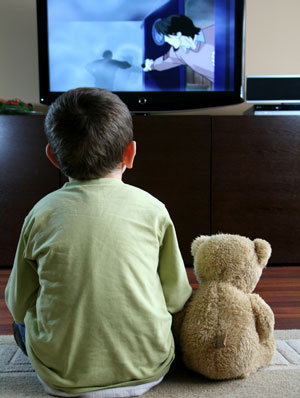
 Recent studies on the role of media in the lives of families reveal that television plays a central part. The total hours of viewing television have also increased manifold over the last two decades. The shocking fact is that parents themselves allow the television to play on and on, virtually making it their child`s babysitter! There may be a situation where parents are guilty for allowing it themselves, yet there may be a situation where parents are not directly responsible and worse still, unaware. The impact of unregulated and indiscriminate viewing of television is immediate on the child, even though it may take a while for the parent to detect. Such is its ability to influence the young mind, that undoing is really an enormous task. What is causing it`
Recent studies on the role of media in the lives of families reveal that television plays a central part. The total hours of viewing television have also increased manifold over the last two decades. The shocking fact is that parents themselves allow the television to play on and on, virtually making it their child`s babysitter! There may be a situation where parents are guilty for allowing it themselves, yet there may be a situation where parents are not directly responsible and worse still, unaware. The impact of unregulated and indiscriminate viewing of television is immediate on the child, even though it may take a while for the parent to detect. Such is its ability to influence the young mind, that undoing is really an enormous task. What is causing it`
-
- Many homes have a separate television in the child`s room. In such cases, keeping a tab on viewing hours is next to impossible.
- Parents are clueless of how to entertain when their child feels bored. They are tempted with the easy solution of putting on the TV. Read more on 5 Activities For Spending Quality Time With Your Child, Motivating your child to Read
- A large number of parents are themselves watching TV for long hours. TV viewing is perhaps all they do when at home or back from work. Read more on Positive Parenting
- There are so many channels airing TV programmes for children dedicatedly that there is something of your child`s interest always playing on one of the channels.
- Another possible reason is, children who are shy and cannot connect easily with other make friends with the television.
How can you understand if your child is watching too much television`
-
- The most obvious sign is that the child will like to be left in front of the TV with little or no concern about what is around him.
- He will do his daily chores like polishing shoes arranging his books etc, while in front of the TV. He may refuse to have dinner anywhere else but only when seated in front of the TV.
- Watch his language. No matter how well a programme is created, the dialogues for children are written by adults. Hence there is a fair number of crisp and curt phrases used in the children`s programmes as well. Read more on 5 Ways to deal with children using abusive language
-
- Sudden irritability in your child`s behaviour may be attributed to the extra hours in front of the television. At times it is in response to those moments when he is compelled to do other things like homework and chores. While at other times, it is due to the cloud of thoughts in his mind which he is trying to process as there is just too much information bombarded on the child by the TV. Read more on does your child have a bad temper`
- Your child begins to ask for strange things and food or beverage which you have not heard about. Because along with the programme, your child is watching the commercials being aired too.
How can you help your child`
-
- First, watch your own viewing pattern and cut it down if necessary. The best way to teach your child is by setting an example.
- Never discuss television programmes yourself with friends and guests as well.
- Stipulate duration of viewing each week and teach the child to prioritize and make a schedule of the programmes he would like to view. This way, you allow the child to compensate as well in case on any day he is watching for an extra hour.
- Don`t become too harsh, because some visual stimulus is beneficial for the child. Rather teach him to select informative programmes. Whenever possible watch such programmes together with your child.
- Make dinner a mandatory family time for everyone. It is a good way to teach the value of being together and bonding as a family.
- Actively cultivate your child`s hobbies, or enroll him in hobby classes. Read more on why is it important to have a hobby`
- Invite your child`s friends for play dates and other fun activities. This will help your child to discover the joy of making friends and it would surely give new things to think about.
Any measure which you take to modify or correct your child`s behaviour must be implemented consistently. It is better to proceed slowly than having to step back. At each step ensure your child`s acceptance and readiness for change. That would make your effort successful. Also read: Children and TV: Limiting your child`s screen time
